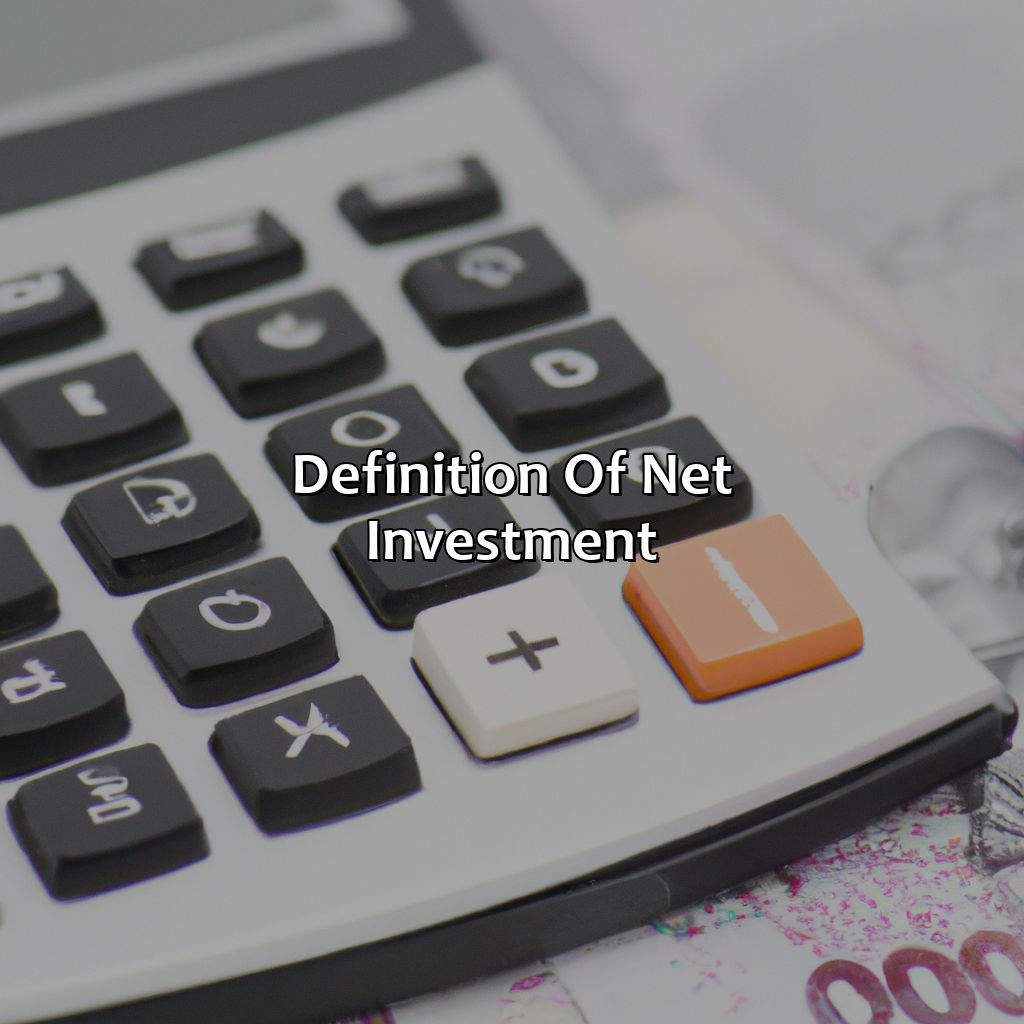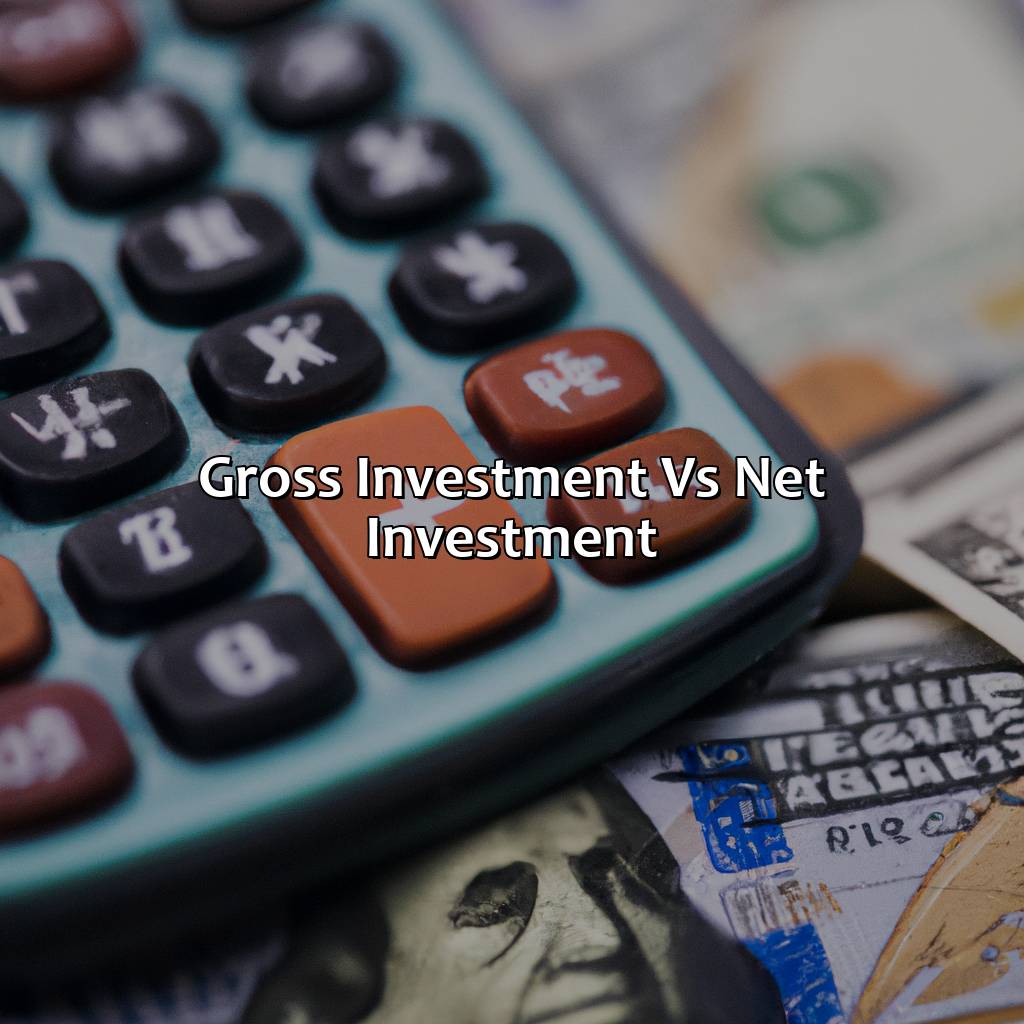What Is Net Investment?
Key Takeaways:
- Net investment refers to the difference between gross investment (total investment spending) and depreciation (the decrease in value of assets over time). It represents the net increase in a company’s capital stock over a given period.
- Gross investment is the total amount of money spent on acquiring new capital goods or replacing outdated ones, while net investment takes into account the value of assets that have depreciated. Companies aim to maximize their net investment to increase their capital stock and improve their productivity.
- Several factors can affect net investment, including economic conditions such as interest rates and consumer demand, as well as government policies like taxation and regulation. Companies must consider these factors when making investment decisions.
Are you wondering what net investment is and how it affects your finances? You’ve come to the right place. Discover the key elements of net investment income and the impact it has on your financial well-being.
Definition of Net Investment
Net investment refers to the difference between the total amount of investment made by a company in fixed assets and the depreciation of those assets over a given period of time. In other words, it is the measure of the net change in capital stock of a business and is an important indicator of a company’s growth and expansion plans. Factors such as changes in technology, market demand, and competitive landscape can influence a company’s net investment decisions.
As businesses continue to evolve, net investment plays a vital role in their long-term success. By regularly evaluating net investment, companies can make informed decisions regarding financial planning, investment allocation, and business strategy.
It is worth noting that net investment does not take into account other expenses such as taxes, interest payments, or capital gains. Therefore, it is important to consider the overall financial picture of a company before making any investment decisions.
A study by the Organisation for Economic Co-operation and Development found that high levels of net investment are associated with increased productivity and economic growth. This highlights the importance of a company’s investment decisions in driving overall economic progress.

Image credits: retiregenz.com by Joel Washington
Gross Investment vs Net Investment
As a business owner, understanding the difference between Gross Investment and Net Investment is crucial. Gross Investment is the total amount of investment made without taking into account the depreciation of assets, while Net Investment is the actual amount of investment after deducting the depreciation of assets.
The following table shows the difference between Gross Investment and Net Investment:
| Gross Investment | Net Investment | |
|---|---|---|
| Definition | The total amount of investment made without deducting the depreciation of assets | The actual amount of investment made after deducting the depreciation of assets |
| Calculation | Gross Investment = Net Investment + Depreciation | Net Investment = Gross Investment – Depreciation |
| Importance | Helps in calculating the amount of capital expenditure incurred to maintain or expand the business | Gives a clear picture of the actual amount of money invested and the value of the assets |
It is important to note that Gross Investment includes all investments made during a period, whereas Net Investment reflects the actual amount of money invested after taking into account the depreciation of assets. This helps in understanding the true value of the assets owned by the business.
When making investment decisions, it is essential to consider both Gross and Net Investment. Gross Investment provides an overview of the total expenditure incurred by the business, while Net Investment shows the actual value of the investment made, which helps in determining the profitability of the business.
Investing in a business is a significant decision, and understanding the difference between Gross and Net Investment is crucial in making the right choice.
Make informed investment decisions by considering the difference between Gross Investment and Net Investment. Don’t miss out on maximizing your profits by not taking into account the depreciation of assets.
Image credits: retiregenz.com by David Duncun
Factors Affecting Net Investment
Net Investment Factors
The factors that affect net investment include incentives, interest rates, tax policies, technological changes, and consumer confidence. These variables can alter the amount of capital that firms are willing to invest and the demand for investment among consumers.
Table of Factors Affecting Net Investment
Net Investment Factors:
| Incentives | Interest Rates | Tax Policies | Technological Changes | Consumer Confidence |
|---|---|---|---|---|
| High | Low | Favorable | Positive | Strong |
Unique Details of Net Investment Factors
Favorable tax policies can incentivize companies to increase their net investment, while technological advancements can lead to further investment in research and development. Consumer confidence also plays a significant role in determining the level of net investment in the economy.
Fear of Missing Out on Net Investment
Stay ahead of the competition and don’t miss out on potential gains by keeping track of the factors that affect net investment. By being aware of changes in incentives, interest rates, tax policies, technological advancements, and consumer confidence, you can make informed decisions for your investments and stay ahead of the game. Don’t let fear hold you back from maximizing your returns.

Image credits: retiregenz.com by Adam Jones
Importance of Net Investment
Net investment plays a pivotal role in the growth of an economy. It refers to the total expenditure made on purchasing new capital assets minus the depreciation cost. Net investment assists in increasing the country’s productive capacity by adding new equipment, tools, and infrastructure. This, in turn, results in job creation, higher wages and increased productivity. For businesses, net investment helps in increasing revenue, improving efficiency and competitiveness.
Moreover, net investment helps in predicting economic growth, as it represents the future potential of the economy. Higher net investment indicates that the economy is expanding, and businesses are willing to invest in the long-term prospects. This, in turn, leads to a positive outlook for investors and helps in attracting foreign investments.
Net investment also helps in mitigating risks associated with the obsolescence of capital assets. Companies need to invest in new machines and equipment to stay competitive in the market. By doing so, they can improve their products and services, reduce production time, and increase efficiency, leading to higher profits.
In today’s fast-paced business world, it is essential to keep up with the latest technologies and trends. Failing to do so can result in missed opportunities and loss of market share. Hence, it is vital to invest in new infrastructure, assets and technologies to remain competitive in the long run. Don’t miss out on the benefits of net investment – start planning your investments today!

Image credits: retiregenz.com by Adam Arnold
Five Facts About Net Investment:
- ✅ Net investment refers to the difference between the amount of investment made in a particular period and the amount of depreciation during that period. (Source: Accounting Explained)
- ✅ Net investment can be positive or negative, depending on whether the amount of investment exceeds or falls short of the amount of depreciation. (Source: Corporate Finance Institute)
- ✅ Net investment is an important indicator of the health of an economy, as it reflects the level of investment in productive capital. (Source: Investopedia)
- ✅ Net investment can be influenced by factors such as interest rates, government policies, and business conditions. (Source: The Balance)
- ✅ In order to calculate net investment, it is necessary to subtract the total depreciation expense from the total investment in a given period. (Source: My Accounting Course)
FAQs about What Is Net Investment?
What is net investment?
Net investment is the difference between the total amount of investment spending in an economy and the amount of capital goods that have been replaced due to wear and tear.
How is net investment calculated?
Net investment is calculated as gross investment minus depreciation. Gross investment is the total amount of investment spending, while depreciation is the cost of wear and tear on capital goods.
What is the significance of net investment?
Net investment is important because it shows the level of commitment by businesses to increase their capital stock, which ultimately leads to economic growth.
What are some factors that affect net investment?
Some factors that affect net investment include interest rates, business optimism, government policies, and technological advancements. These factors can either encourage or discourage investment.
What is the relationship between net investment and economic growth?
Net investment is positively correlated with economic growth because it leads to an increase in the capital stock, which in turn leads to an increase in productivity and output.
Can net investment be negative?
Yes, net investment can be negative if the amount of capital goods being replaced due to wear and tear is greater than the amount of new investment spending. This is known as disinvestment.


